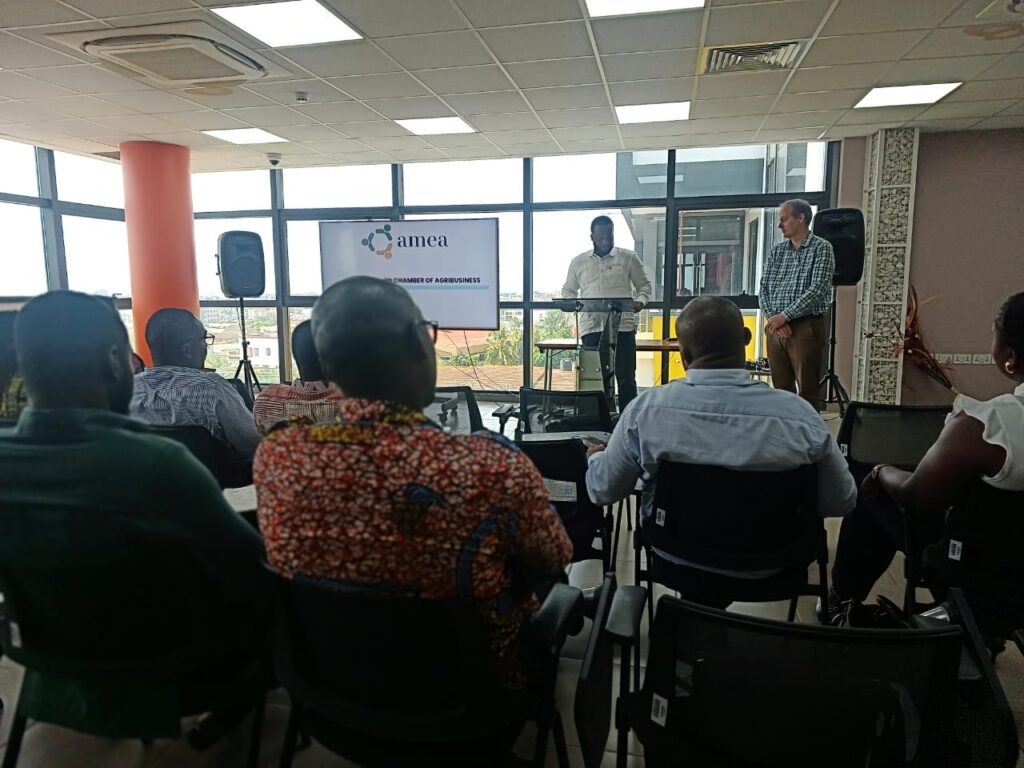A new phase of learning and action

In this Issue
UPCOMING EVENTS
Uganda Technical Working Group: May 28
Tanzania and Rwanda Local Network launches (June). Dates TBC soon!
Agri-SME Learning Event (Utrecht): 3 October
NEW RESOURCES
from your director
In the last Newsletter I talked about our hopes to expand the Network. The good news is that we have taken significant steps in that direction. Local Networks in Ghana, Tanzania and Rwanda were approved by the AMEA Board and this has already led to new opportunities, especially with AGRA’s move to integrate Business Development Services (BDS) system strategies in their new programs. This is very encouraging.
AMEA will also expand its’ work with the Learning into Action initiative. This aims to support 70 case studies in 10 countries over the next 3 years. We will partner with credible National Institutions to provide insights into the highest potential agri-BDS models/approaches and facilitate dialogues to stimulate greater investment in proven approaches and the use of standards and accreditation. The great news is that we recently secured core funding from Small Foundation which will significantly enhance our ability to deliver this initiative. We are also one of the leading organizations in the Global Agri-SME Learning Collective which will allow us to exchange and coordinate knowledge generation and advocacy in the BDS sector.
Filipe and I also visited Kenya, Ethiopia, Benin, Ivory Coast and Ghana in the last few months. I was especially encouraged by the local ownership of the initiatives with local organizations taking leading roles in old and new Local Networks. I was also impressed by the growing appetite to engage in challenging but essential influencing work. Kenya is aiming to develop a BDS Vision. Ethiopia and Benin have started the dialogue on standardization. Tanzania and Ghana are engaging with AGRA with the aim to test best practices in new initiatives. These are all extending AMEA’s reach beyond the current members and partners.
I now look forward to our Annual Learning Event in June where we have some excellent speakers and panels ready for you to engage with. Please register as soon as possible as there are only 100 spaces.
network expansion
AMEA now has 9 Local Networks with the approval of Ghana, Tanzania and Rwanda. The Local Network proposals were appreciated by the Board for the detailed plans which aim to influence BDS markets. AMEA is also experimenting with different types of Local Network Leads with Chamber of Agribusiness taking the lead in Ghana, the Agricultural Non-State Actors Forum (ANSAF) taking the lead in Tanzania and the Rwanda Institute of Cooperative and Enterprise Management (RICEM) taking the lead in Rwanda.
We are now launching the networks with AMEA Ghana taking the lead. On April 25, AMEA Ghana was officially launched at Solidaridad West Africa. This is the result of nearly two years of consultation, discussion and dialogues defining common purpose, searching for synergies and clarifying self- interests and shared interests. As part of the launch, a memorandum of understanding was signed between AMEA and the Chamber of Agribusiness of Ghana as the local lead of the network. Read more here.
AMEA Honduras has also had a re-launch with FUNDER taking the Local Network leadership role. Work is now reorganized around 5 main themes that respond to members interests:
Quality criteria and accreditation mechanisms
Carbon markets and EUDR
Impact Investment opportunities and consortiums for access to funding
Access to markets and alliances with the Private Sector
A common communication strategy and use of media
In addition to launches and re-launches, we have also brought in two new members: the Smallholder and Agri-SME Finance and Investment Network (SAFIN) and Agriterra Ethiopia.
SAFIN and AMEA are now working on exchanging knowledge and developing opportunities for collaboration in countries such as Uganda and India. SAFIN and AMEA are also part of the Agri-SME Learning Collective, which is explained below. Agriterra Ethiopia have been involved in AMEA’s work in Ethiopia through a dairy sector database pilot and membership now indicates their intent to collaborate on sharing learning and influencing change in Ethiopia.Farm Africa.
We are also developing a pipeline of new local members using the new membership tier. Now organizations which operate only in one country can join AMEA for Euro 1,000. Please share this with your BDS partners!
LEARNING INTO ACTION
AMEA is starting the Learning Into Action phase of its knowledge generation and management activities. We will continue building knowledge in the network, leveraging from previous experiences with case studies and the ISF Advisors study on effectiveness and efficiency of Business Development Services.
AMEA will focus on the formation of Communities of Practice in 10 countries to produce 70 mini-case studies in the next 3 years. The cases will target the generation of lessons on the cost-effectiveness, scalability, and sustainability of BDS approaches, as well as on additional cross-cutting themes of relevance for the AMEA network. These lessons will be used to inform action in the countries through policy briefs.
AMEA is currently preparing to kickstart the initiatives, engaging local stakeholders and potential partners in Benin, Côte d’Ivoire, Ethiopia, Ghana, Honduras, India, Kenya, Rwanda, Tanzania, and Uganda. The next steps are:
- Forging partnerships with National Institutions that have the mandate and experience to lead the qualitative and policy coordination aspects of the case studies. AMEA will sign MoUs with one organization in each country
- Capitalizing on local networks’ experience to identify existing learning initiatives and platforms from which Learning Into Action can build on
- Mapping programs and projects with high-quality data available for potential selection for the study
- Drafting the methodology with feedback from the Toolbox WG members, Local Networks, and partner National Institutions
- Piloting 10 mini-case studies in 2024/25. AMEA expects to launch the first call for case studies in July
If you are interested in this project and would like to know more about how to participate, reach out to Filipe Di Matteo.
BDS ROADMAPS – PROGRESS IN ETHIOPIA AND BENIN
BDS Roadmaps are now live in most Local Networks and they can be found here. The Roadmaps are developed by BDS stakeholders with the intention to identify the strategic actions necessary to significantly improve agri-BDS markets, encourage collaboration between stakeholders and crowd-in resources. In this newsletter we highlight progress made in Ethiopia and Benin.
 ETHIOPIA
ETHIOPIA
 BENIN
BENIN
In collaboration with the Direction de la Législation Rurale de l’appui aux Organisations Professionnelles et à l’Entrepreneuriat Agricole (DLROPEA) and the Direction du Conseil Agricole des Innovations et de la Formation Entrepreneuriale (DCAIFE), AMEA has launched a study to assess the feasibility of improving the national database on Farmer Organisations and the national registry of 150 accredited Agri-BDS by incorporating additional information while examining the accessibility of the information. The study will examine the feasibility of incorporating key indicators from IWA29, extending the register of OPAs to Agri-SMES and connecting the two databases to create a more efficient BDS market ecosystem. Technical support to improve those databases based on the results of the feasibility study will follow.
AMEA Benin has also been working with the National Chamber of Agriculture to establish a BDS association in Benin. Two dialogues have been conducted to date, with enthusiastic engagement of over 60 BDS providers across the country. The third dialogue is expected to agree on how the platform will operate and setting up a (transitory) governance committee.
In 2023, The AMEA chapter in Benin organized a national dialogue resulting in the draft roadmap for BDS (farm advisory service) in Benin. The aim of the roadmap is to support the development of synergies between current and planned agri-BDS initiatives, and to establish a platform for action learning based on credible data sets.
new resources
The AMEA Toolbox now has a dedicated web page. Browse through it for more detailed information about the AMEA Toolbox and related resources.
AMEA also has a webpage for members to Learn & Act. Browse the page for access to AMEA’s resources on case studies, events, news, local network roadmaps, and more information on works around standards/accreditation and innovation within the network.
IFC has wrapped up its ALP’s first regional conference, enabling insightful, and lively discussions among participants and experts – many of which from AMEA member organizations. The positive feedback received highlighted the need to further organize similar platforms where ALP stakeholders and potential partners can network and share their experiences.
